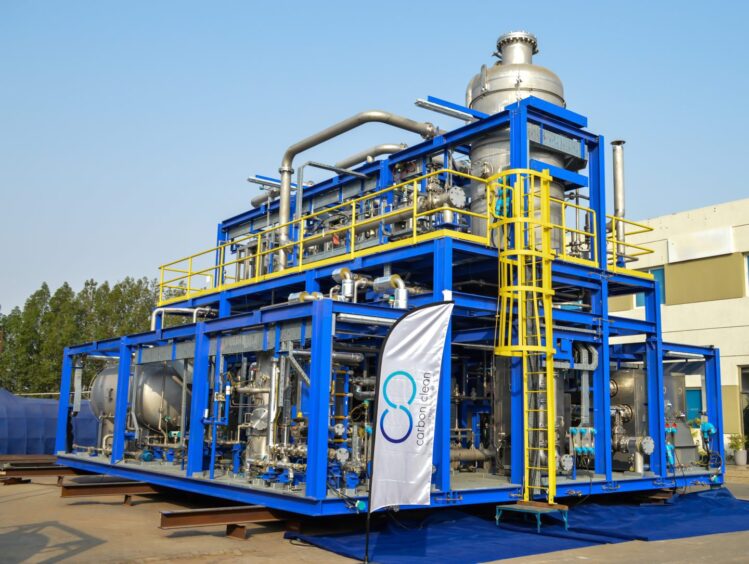
The new Government’s ambition to make Britain a clean energy superpower makes it an exciting time to be a clean tech company.
The next five years will be make or break for establishing the UK clean tech supply chains, manufacturing facilities and infrastructure required to achieve net zero by 2050.
I see a real opportunity for the UK to establish itself as a world-leading exporter of clean tech, especially in innovative industries such as carbon capture, utilisation and storage (CCUS), which play a major role in delivering decarbonisation goals.
The UK has an extensive legacy in energy, from our long-standing oil & gas projects in the North Sea to our pioneering renewable sector.
The expertise from these existing industries gives us a significant competitive advantage, as does the clean tech talent pool and innovation we can draw upon in our country’s unrivalled university ecosystem – not to mention our world-leading financial services sector.
The challenge for this Government will be lining up all these undoubted advantages to work in concert to really supercharge the country’s clean tech potential.
The primary focus should be on realising the full potential of companies operating in innovative industries, whether it’s CCUS, hydrogen, nuclear fusion or floating wind energy.
This is where high-growth opportunities are located, in companies that are driving deep decarbonisation change.
Investment into these industries, both by government and private markets, will see the UK take our large pool of fast-growing, R&D-intensive businesses and turn them into clean tech giants, both domestically and at a global level.
Strengthening UK supply chains is one of the most pressing areas requiring attention. I’ve seen first hand how challenges in the supply chain can be critical, but also how building supply chain capacity can really push companies forward.
Establishing robust supply chains encompasses everything from investing in components where there is a considerable danger of shortages to building general capacity so that supply chains can invest in new products as market opportunities arise.
Local content requirements are also key to success and should be embedded in the National Wealth Fund (NWF), as well as other programmes. This would serve as a springboard to exports and a signal of Government commitment to the CCUS sector.
Decisive action must be taken to ensure that manufacturing facilities are set up in the UK. Developing this manufacturing capacity in the UK could deliver huge economic benefits.
According to the Carbon Capture and Storage Association (CCSA), the UK’s CCUS pipeline could create 70,000 new jobs, as well as protect 77,000 existing roles.
As a country we failed to grasp the employment opportunities of offshore wind, building up our generating capacity but allowing other countries to overtake our manufacturing capability. This mistake must not be repeated with CCUS.
Companies and investors require a stable investment framework, one that can only be established by government.
A clear timetable for when and where government support will be allocated is key in this. Visibility and predictability are vital for supply chain businesses across clean tech so they can upgrade their own capabilities.
In the CCUS industry for example, we know that setting out timelines for carbon contracts for difference (CfD) auctions far in advance would give confidence to suppliers about when they can expect projects to proceed and plan for demand increases.
Alongside this, we await greater clarity on the Green Industries Growth Accelerator (GIGA) and the development of the NWF – though the early signs from the Taskforce’s report were positive.
The NWF can play a vital role in crowding in capital from the financial sector to unlock our clean tech potential and encouraging inward investment.
Initial funding provided by the NWF, combined with regulatory certainty from government, will help derisk private sector investment into the evolving innovative technologies required for net zero.
This type of transformative change would deliver maximum value for money to taxpayers and enable the UK to become a powerful clean tech exporter, leading to a surge in economic growth.
For too long, the UK has too often focused on drawn-out, formal competitions for pre-allocated pots of money. This has slowed and even deterred investment, causing our country to fall behind other major global economies.
I’d argue that while programmes should be competitive, there is no discernible benefit to them being competitions. The formal competition process is time-consuming and resource-intensive, with no guarantee of success.
This approach disincentivises some of the UK’s most innovative companies, which are typically smaller in size.
The NWF could mark a welcome move away from this model, with a greater commitment to flexibility in terms of the investments it can make and the financial products available.
The clean tech sector needs certainty and investment to grow. The window of opportunity won’t last forever so focus and prioritisation are key.
Swift action will bring numerous advantages and benefits. Material commitment and delivery from both government and the private sector will make the UK a leading developer, deployer and exporter of clean tech.
Technology developed right here in the UK could be rolled out around the world by the end of the decade, with the right signals, support and incentives.
Now is the time to develop the supply chains and infrastructure needed to make the UK a global leader in clean tech. The opportunity is too huge to ignore.
Recommended for you
